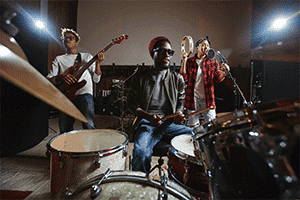Sports are the most common pastime enjoyment for millions of Americans. From cheering on your favorite football or basketball team to watching the Olympics every four years, live sports captivates millions of people every year.
But did you know watching or partaking in your favorite sports can actually affect your hearing? Discover how your favorite pastime can affect your hearing and what you can do to be proactive.
How Loud is Too Loud?
Sounds that reach over 85 decibels are considered to be too loud and can cause damage to your hearing. Sound is measured in decibels (dB). The higher the decibel level, the louder the noise. Sounds above 85dB but below 100dB can be detrimental to your hearing when exposed to them over a period of time. Any sound over 100dB can harm your hearing after just one time!
When it comes to your favorite pastime activity, a filled sports stadium can range from 105dB to a damaging 130dB. If you plan on attending a game this season, it’s important to wear proper hearing protection. Multiple screaming fans can cause serious damage to your hearing, resulting in tinnitus, temporary hearing loss, and in some cases permanent hearing loss.
We Can Help You Be Proactive
Your hearing is an important part of you overall health and well-being. You need your hearing to continue to enjoy your favorite activities and to communicate with your loved ones. It’s important to protect your hearing by wearing earplugs whenever you are exposed to loud sounds.
If you enjoy watching live sports or you play on a team where the crowd gets loud, it’s important to wear hearing protection. We can create custom hearing protection that will fit the unique shape of your ears. With our custom hearing protection, you will be able to prevent noise-induced hearing loss while still hearing the soft sounds around you.
Start protecting your hearing today! Contact us to schedule your appointment. We can test your hearing or take molds of your ears to create a pair of custom fit earplugs.

